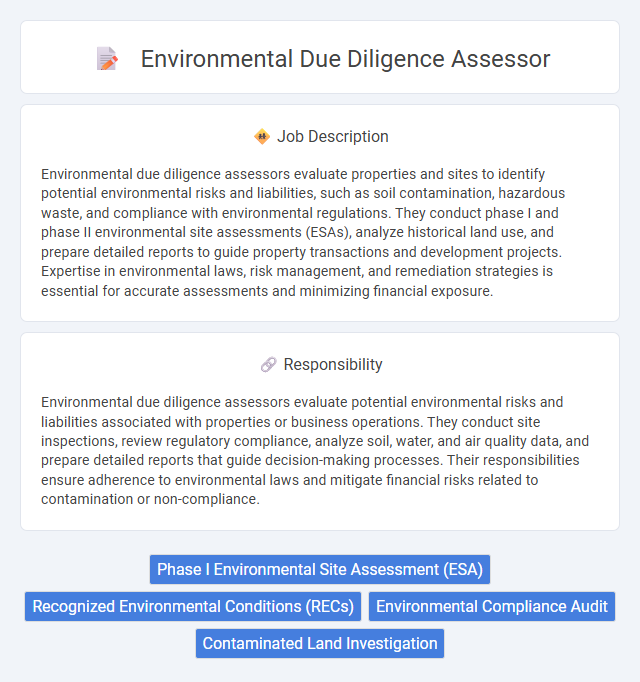
Environmental due diligence assessors evaluate properties and sites to identify potential environmental risks and liabilities, such as soil contamination, hazardous waste, and compliance with environmental regulations. They conduct phase I and phase II environmental site assessments (ESAs), analyze historical land use, and prepare detailed reports to guide property transactions and development projects. Expertise in environmental laws, risk management, and remediation strategies is essential for accurate assessments and minimizing financial exposure.
Individuals with strong analytical skills and attention to detail are likely to excel as environmental due diligence assessors, given the job's demand for thorough site evaluations and risk assessments. Those with a background in environmental science or engineering may find the technical aspects of the role more approachable, increasing their suitability. Candidates who thrive in dynamic environments and can manage complex regulatory requirements probably have a higher likelihood of success in this position.
Qualification
Environmental due diligence assessors require a strong background in environmental science, engineering, or related fields, often supported by a bachelor's or master's degree. Professional certifications such as Certified Environmental Professional (CEP) or Registered Environmental Assessor (REA) enhance credibility and expertise in evaluating site conditions and regulatory compliance. Proficiency in environmental regulations, risk assessment methodologies, and data analysis tools is essential for accurate reporting and mitigation planning.
Responsibility
Environmental due diligence assessors evaluate potential environmental risks and liabilities associated with properties or business operations. They conduct site inspections, review regulatory compliance, analyze soil, water, and air quality data, and prepare detailed reports that guide decision-making processes. Their responsibilities ensure adherence to environmental laws and mitigate financial risks related to contamination or non-compliance.
Benefit
Environmental due diligence assessors likely provide significant benefits by identifying potential environmental risks and liabilities before property transactions. Their expertise can help businesses avoid costly remediation and regulatory penalties, increasing overall project viability. This proactive approach probably enhances compliance with environmental laws and promotes sustainable development practices.
Challenge
Environmental due diligence assessors likely face challenges in accurately identifying potential risks due to incomplete or inconsistent data from various sources. The complexity of regulatory frameworks may increase the probability of oversight or misinterpretation during evaluations. Navigating these uncertainties requires detailed knowledge and critical analysis to minimize environmental liabilities effectively.
Career Advancement
Environmental due diligence assessors analyze site conditions to identify potential contamination risks, ensuring compliance with environmental regulations. Career advancement opportunities include moving into senior assessor roles, environmental consulting management, or specializing in risk assessment and regulatory affairs. Professionals can also pursue certifications like Certified Environmental Auditor (CEA) to enhance expertise and increase marketability.
Key Terms
Phase I Environmental Site Assessment (ESA)
A Phase I Environmental Site Assessment (ESA) is a critical process conducted by environmental due diligence assessors to identify potential or existing environmental contamination liabilities on a property. This involves a comprehensive review of historical records, site inspections, and interviews to evaluate the presence of hazardous materials, petroleum products, or environmental impairments. The assessor delivers a detailed report that helps stakeholders make informed decisions regarding property transactions, development, or compliance with environmental regulations.
Recognized Environmental Conditions (RECs)
Environmental due diligence assessors specialize in identifying Recognized Environmental Conditions (RECs) during Phase I Environmental Site Assessments (ESAs). They evaluate property history, site usage, and potential contamination sources to determine environmental risks affecting real estate transactions and regulatory compliance. Accurate identification of RECs helps prevent liability and guides remediation strategies in property development and investment decisions.
Environmental Compliance Audit
An Environmental Due Diligence Assessor specializing in Environmental Compliance Audits evaluates facilities to ensure adherence to local, state, and federal environmental regulations. They analyze operational processes, waste management practices, and emissions data to identify compliance risks and recommend corrective actions. This role requires expertise in environmental laws, standards such as EPA guidelines, and effective reporting to support regulatory requirements and minimize liability.
Contaminated Land Investigation
Environmental due diligence assessors specializing in Contaminated Land Investigation conduct comprehensive site evaluations to identify potential soil and groundwater contamination risks. They utilize advanced sampling techniques and analytical methods to detect hazardous substances, ensuring compliance with environmental regulations such as the Comprehensive Environmental Response, Compensation, and Liability Act (CERCLA). Their detailed reports guide remediation planning, risk mitigation, and facilitate informed decision-making in real estate transactions and land development projects.
 kuljobs.com
kuljobs.com